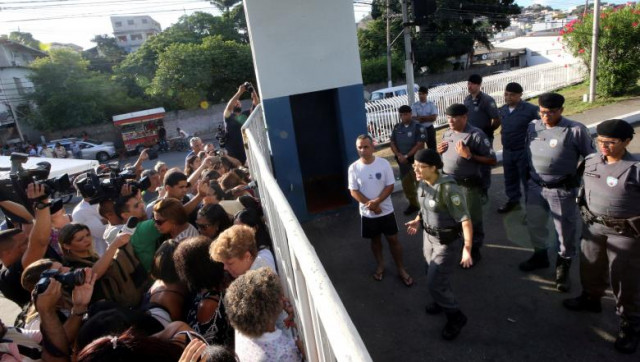Brazil police refuse to end week-long strike in state plagued by murders
Government announced hours earlier that a deal had been struck to end strike that has led to sharp increase in murders

A military police officer (R) talks with relatives of police officers who are blocking the main entrance of police headquarters, during a police strike over wages, in Vitoria, Espirito Santo, Brazil February 11, 2017. PHOTO: REUTERS
Most of the violence has been centered in the poor regions of metropolitan Vitoria, the state capital, which is ringed by beaches and where the petroleum, mining and port industries have a strong presence.
On Saturday, Vitoria streets were calm as more soldiers and elite federal police arrived in the state, with more than 4,000 in place to bolster the initial deployment of 1,200 soldiers.
At least 33 prisoners killed in new Brazil prison uprising
Officials in the state, located just north of Rio de Janeiro, said late Friday that they had reached an agreement with representatives of the police for patrols to resume at 7 a.m. (0900 GMT). But family members of the officers told Reuters that no such accord had been reached.
Defense Minister Raul Jungmann and Brazil's chief prosecutor, Rodrigo Janot, met with state officials and representatives of the police in Vitoria on Saturday in an effort to advance negotiations, but no accord was reached.
Jungmann told the UOL news portal that striking police officers "are contributing to the rise in crime" and that "whether they know it or not, are on the side of the criminals that are killing citizens."
The wives of police and other relatives, who have led the strike by forming human blockades of barracks, refused to budge Saturday.
Amazon massacre: Up to 60 dead in Brazil prison riot
Under Brazilian law, it is illegal for police to strike, which is why their family members have taken action to physically prevent police cars leaving barracks. The police themselves have not tried to remove their families, leading to fears among some of the relatives that soldiers could try to remove them by force.
The striking police said they had not received a raise in four years and their base pay of about 2,700 reais ($867) a month was among the lowest in Brazil.
Aline Santana, an 18-year-old mother of two young boys, was out for a walk in central Vitoria on Saturday, and her mix of understanding and frustration echoed the sentiments of many citizens.
"I think most people understand their need to strike, but they are leaving the population vulnerable to all types of threats," she said. "If they had been on strike for two or three days, we could take it. But a week of being in this chaos is not acceptable."
Officials have closed schools, clinics and public transportation, while shops and other businesses have remained shuttered, causing over $30 million in losses, a state retail association said.
Espirito Santo is one of several Brazilian states hit by a budget crisis that is crippling essential public services. The police strike over pay has left a security vacuum and led to rampant assaults, robberies and looting, often in broad daylight.
The police union said Saturday that 138 people had been murdered in the state since last Saturday - a six-fold increase over the average homicide rate in 2016. State security agents have said that most of the murders appear to be related to the drug trade or other crimes, although bystanders have also been caught up in the violence.
Limited protests by police in Rio de Janeiro on Friday and Saturday alarmed residents of the metropolitan area of 12 million people, where crime has spiked in the past year. But state officials said more than 95 percent of police were on patrol in Rio, calming fears of an imminent strike.



















COMMENTS
Comments are moderated and generally will be posted if they are on-topic and not abusive.
For more information, please see our Comments FAQ